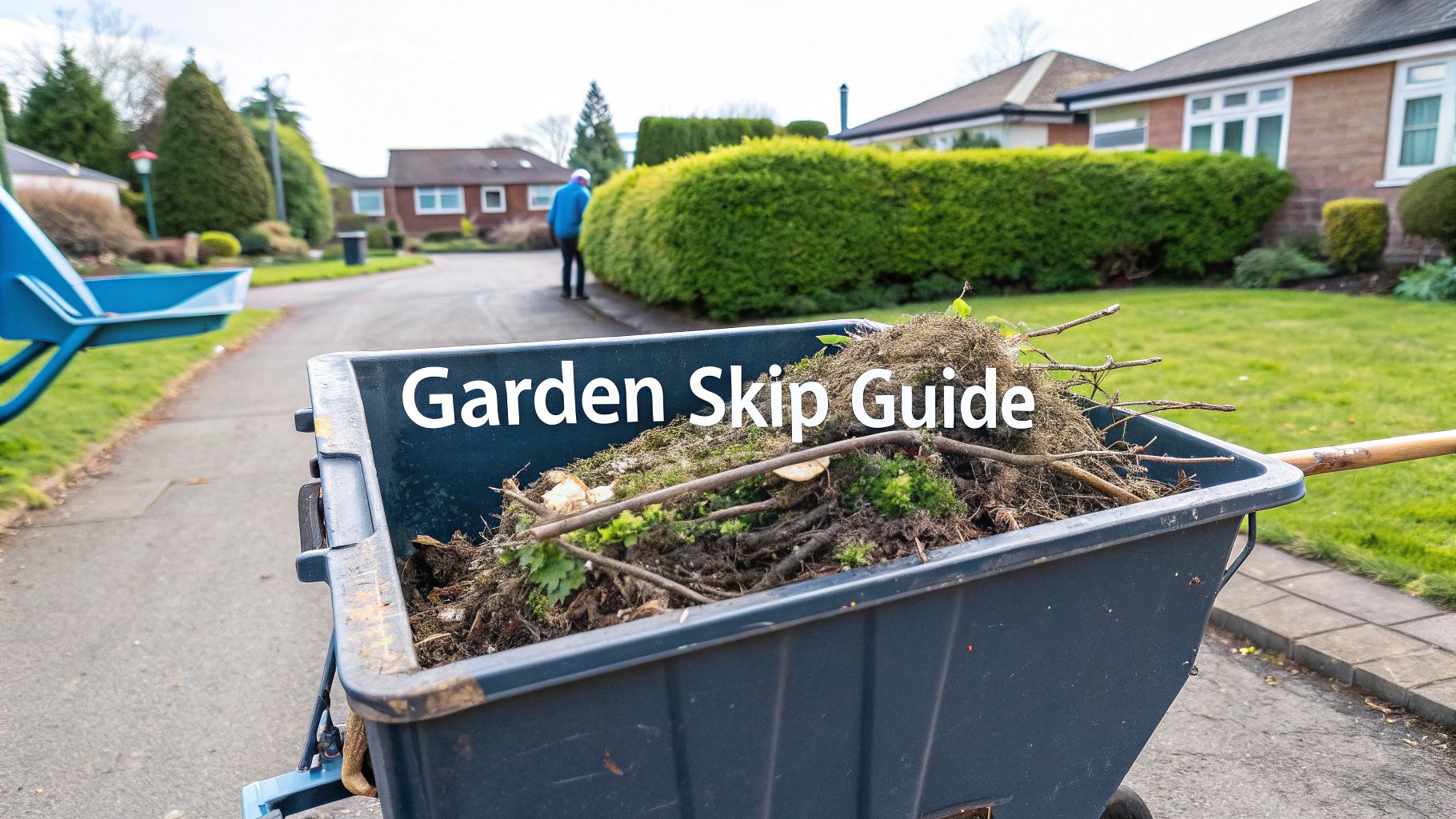Your Guide to Skip Hire in Weymouth
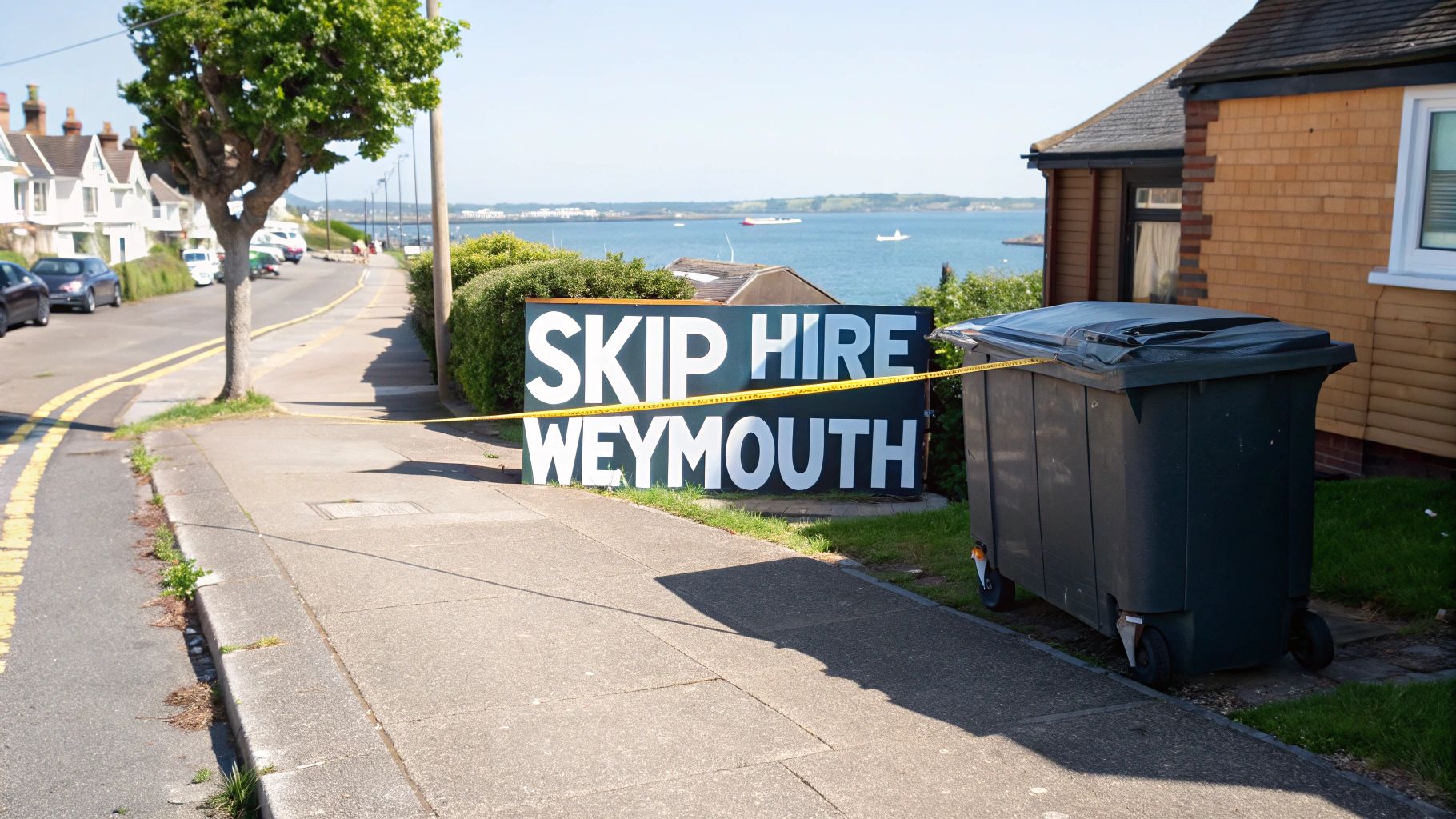
Your Guide to Skip Hire in Weymouth
Got a project on the go in Weymouth? Whether you're finally clearing out the garden, giving the kitchen a makeover, or managing a full-scale building site, you'll know that dealing with the waste is half the battle. Hiring a skip is easily the most sensible way to handle it. It saves you endless trips to the tip and keeps everything neat, tidy, and above board.
Your Starting Guide to Weymouth Skip Hire
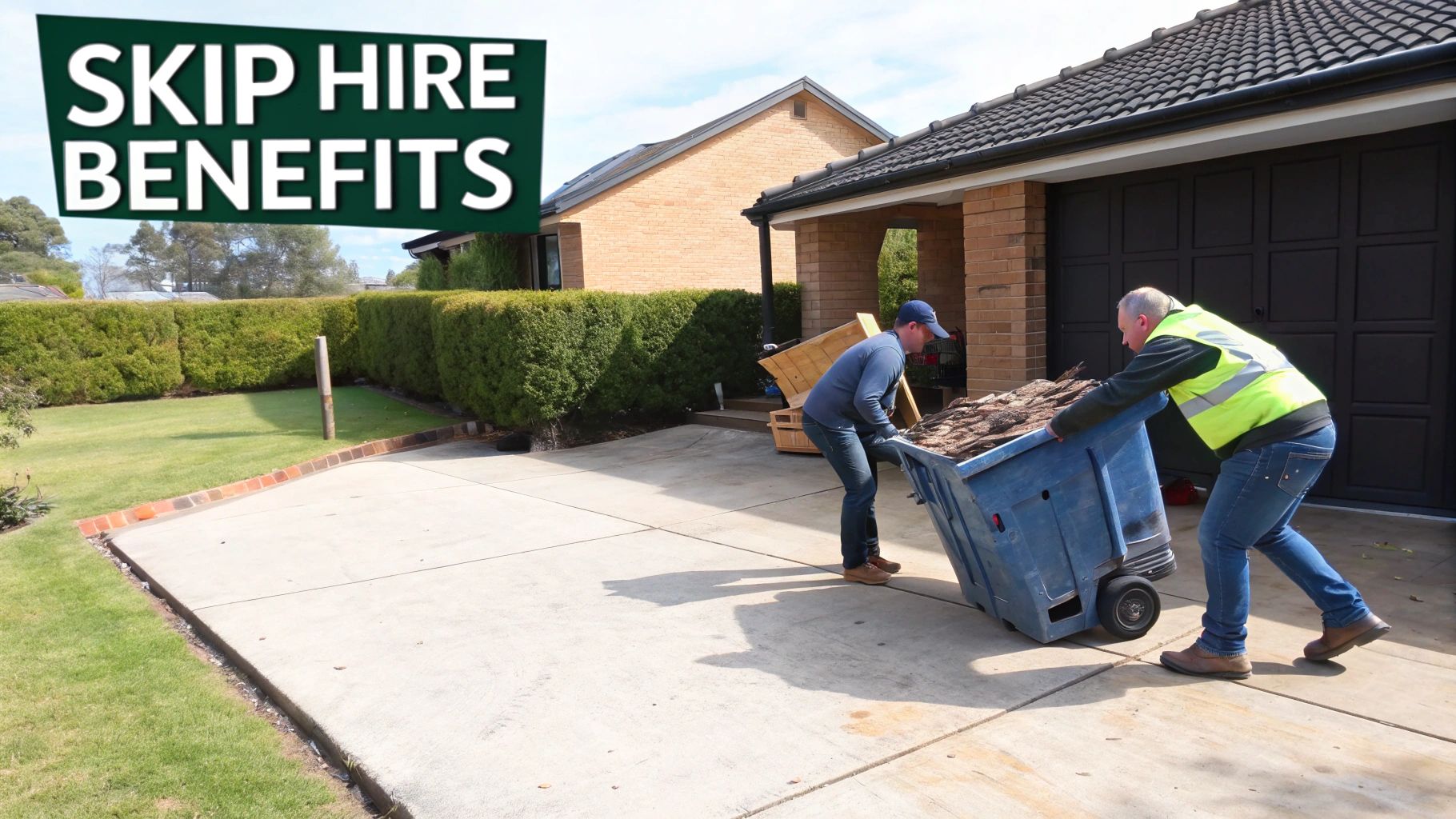
From a simple garage clear-out to a major home extension, figuring out what to do with all the rubbish is a crucial part of the plan. For anyone in Weymouth, hiring a skip is the go-to solution. It takes the hassle out of lugging waste around yourself and gives you confidence that it’s all being handled properly.
This guide isn't just a list of definitions. We're going to walk you through the entire process, step-by-step. We'll cover everything from picking the right size skip for your job to getting your head around the local council rules, so you can make a smart, cost-effective choice.
Why Professional Skip Hire is Essential
Bringing in a professional skip hire company is about more than just convenience. It’s about doing things safely, legally, and with an eye on the environment. A reputable local firm will make sure your waste goes to a licensed facility where it can be properly sorted. The goal is always to recycle as much as possible, not just dump it in a landfill.
The skip hire industry is a surprisingly big part of the UK's waste management system. With over 1.5 million skips hired every year, it’s a sector driven by everything from big construction jobs to the nation's love for home improvements. This constant demand, especially in busy areas like Weymouth, shows just how important it is to choose a provider who really knows what they're doing. If you're interested in the numbers, you can find more market analysis on the skip hire industry from Plimsoll.
Hiring a skip isn't just about getting rid of rubbish; it's about partnering with a service that handles your waste legally and sustainably, giving you complete peace of mind.
To get your planning off to a smooth start, we've put together a quick checklist. Run through these key points before you pick up the phone or book online.
Your Weymouth Skip Hire Decision Checklist
This table breaks down the essentials you need to think about before locking in your skip hire. A few minutes of planning here can save you a lot of time, money, and stress down the line.
| Decision Point | Key Consideration | Why It Matters |
|---|---|---|
| Project Scale | Get a realistic estimate of how much waste you'll have. | Choosing the right skip size means you won't pay for empty space or face the extra cost of ordering a second one. |
| Skip Placement | Figure out if the skip can fit on your driveway or if it needs to go on the road. | A skip on a public road in Weymouth requires a permit from Dorset Council, which adds extra cost and lead time. |
| Waste Type | Know exactly what kind of materials you need to get rid of. | Certain items (like plasterboard, tyres, and electronics) are not allowed in a general waste skip and need special disposal. |
Considering these three things is the foundation of a hassle-free hire. Once you have a clear idea of your needs, you're ready to find the perfect skip for your job.
Choosing the Right Skip Size for Your Project
Getting the skip size right is probably the single most important decision you'll make. It's the key to keeping your project running smoothly and, just as importantly, on budget. Go too small, and you're stuck with the hassle and expense of ordering a second one. Go too big, and you're literally paying for fresh air. Nailing it from the outset is what makes skip hire in Weymouth a breeze.
Think of it like packing a suitcase for a holiday. You wouldn’t drag a huge trunk along for a weekend away, but you also wouldn't try to cram two weeks of clothes into a tiny carry-on. The same logic applies here – the skip needs to fit the job.
Matching the Skip to the Job
The best way to get a feel for what you need is to visualise the capacity of each skip. Forget cubic yards for a moment; let's talk in a language we all understand: black bin bags. It’s a simple comparison, but it makes estimating the amount of waste from your project so much easier.
Here’s a quick rundown of the most common sizes we offer:
- 2-Yard 'Mini' Skip: Absolutely perfect for those small garden clear-outs or a weekend DIY blitz. It holds around 20-30 bin bags.
- 4-Yard 'Midi' Skip: A really versatile choice for minor renovations, like ripping out a small bathroom or tackling a bigger garden job. You'll fit about 40-50 bin bags in this one.
- 6-Yard 'Small Builder's' Skip: This is one of our most popular sizes for home projects. It's ideal for things like a full kitchen tear-out or a major declutter. Expect it to hold 60-70 bin bags.
- 8-Yard 'Large Builder's' Skip: The go-to for construction sites and big home renovations. It’s built to handle bulky waste and holds roughly 80-90 bin bags.
Before you make the call, have a proper walk around your project area. Mentally pile up all the waste and try to picture how many bin bags it would fill. A few minutes doing this can save you a lot of guesswork later. For a more detailed look at the options, our guide on what size skip you need offers some extra pointers.
Understanding Waste Types and Volume
What you’re throwing away also plays a big part in your decision. Heavy stuff like soil, rubble, and concrete takes up less physical space but adds a lot of weight. On the other hand, lighter but bulkier items like old furniture or packaging will fill up a skip in no time.
This image shows you exactly what we mean, breaking down what waste can typically go where.
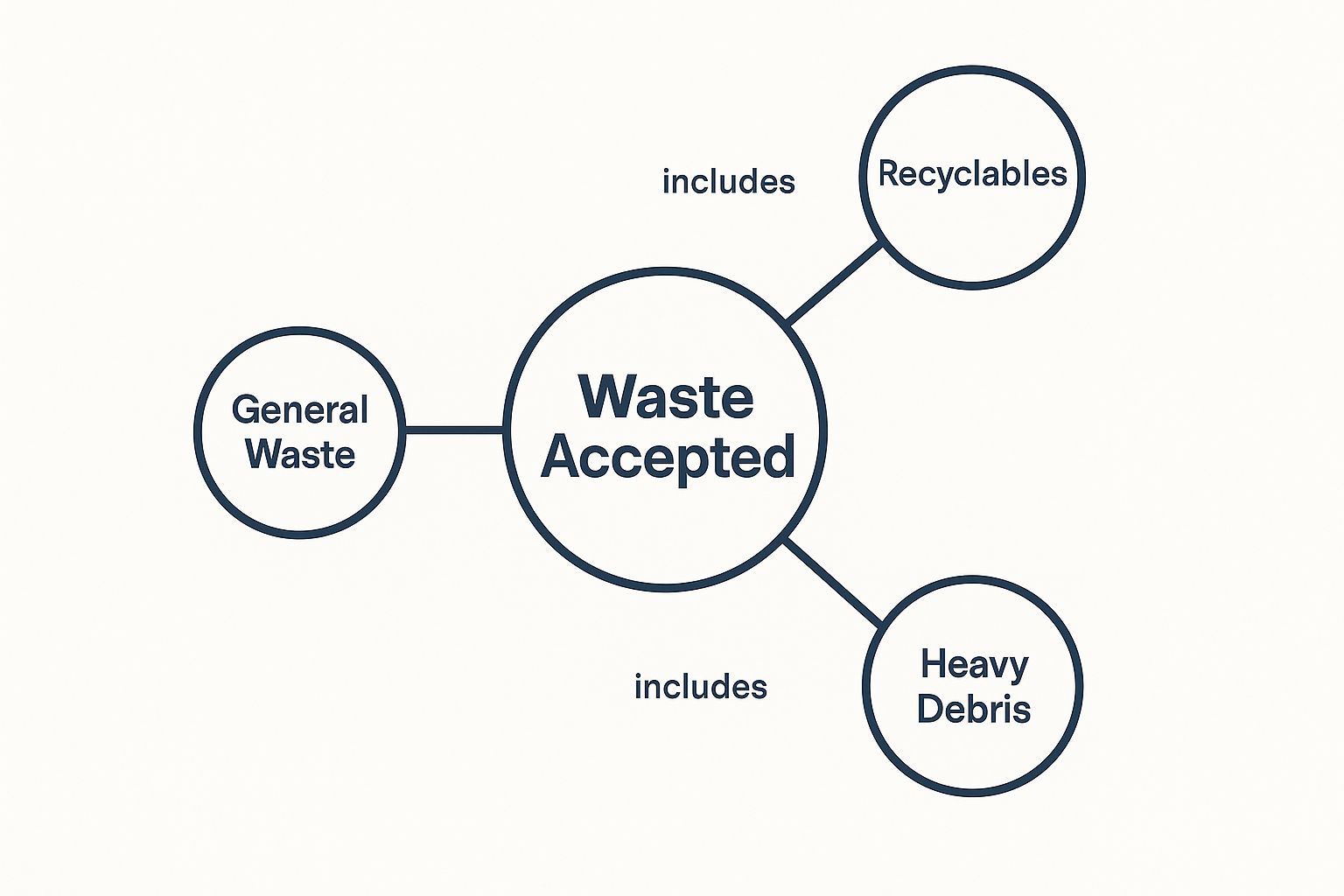
As you can see, it separates general waste from the heavy-duty rubble and recyclables, which is handy for planning how you’ll load everything up.
It's also worth remembering that projects are getting bigger. Recent data from across the UK shows a big shift towards large-scale home refurbishments over smaller repair jobs. These larger projects now generate an average of 8.3 tonnes of waste – a whopping 43% increase compared to minor repairs. This trend directly affects skip hire demand right here in Weymouth, with more people needing larger builder's skips for things like a full kitchen renovation.
A classic mistake is underestimating just how much waste you'll have. Things always look neat and compact before you start taking them apart. That old shed or kitchen unit can suddenly take up a surprising amount of space once it's in pieces.
My advice? Always err on the side of caution. If you're caught between two sizes, it is almost always cheaper in the long run to go for the larger one. It gives you a bit of a buffer and helps you avoid the costly problem of needing a second skip down the line.
Understanding Skip Hire Costs in Weymouth
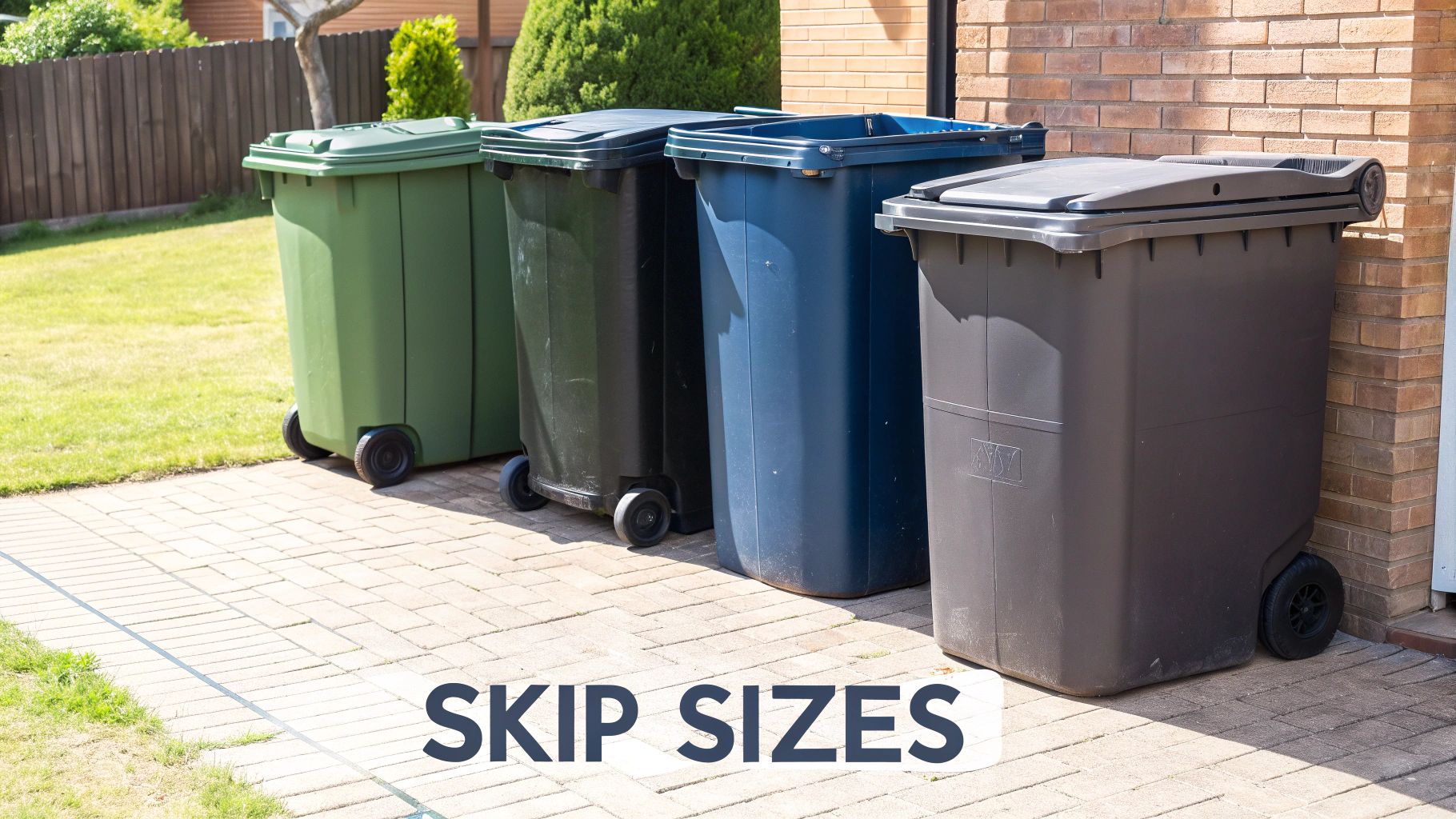
When you’re budgeting for a project, the last thing you want is a surprise bill. That's why getting a clear picture of your skip hire in Weymouth costs from the get-go is so important. The final price isn't just a random number; it's a calculation based on several key factors.
As you might expect, the biggest influence on your quote is the skip size. A 2-yard 'mini' skip for a weekend garden tidy-up will be a lot lighter on the wallet than a massive 8-yard 'builder's skip' for a full-scale home renovation. It really is a simple case of paying for the space you need.
Key Factors That Shape Your Quote
Beyond just the dimensions of the skip, a few other details will tweak the final cost. Thinking about these ahead of time will give you a much more realistic idea of what to expect.
Your quote is generally built around these elements:
- Hire Duration: Most hires include a standard period of one to two weeks. If your project overruns and you need the skip for a bit longer, we can usually arrange that for an additional daily or weekly fee.
- Waste Type: What you're throwing away really matters. Heavier, denser materials like soil, bricks, and rubble cost more to transport and process than lighter, mixed general waste from a house clearance.
- Delivery Location: While most of Weymouth falls into our standard pricing zone, your exact postcode can have a minor impact on the price due to fuel and travel time from our depot.
Factoring these in will help you budget far more accurately. For a more detailed look at how prices stack up across the county, check out our guide to skip hire prices in Dorset.
The Importance of a Level Load
This is a big one. One of the most common—and easily avoidable—extra charges is for overfilling your skip. Every skip has a maximum fill line painted on the side for a reason. It’s not just a guideline; it's a crucial safety rule.
A skip piled high with waste is a genuine hazard on the road. Items can fall out during transit, endangering other drivers, cyclists, and our collection crew. For that reason, our drivers are legally forbidden from transporting an unsafe, overloaded skip.
An overfilled skip is an unsafe skip. Sticking to the level load line is non-negotiable for legal and safe transportation, preventing refused collections and unexpected fees.
If our driver arrives and can't safely collect the skip, you'll be asked to remove the excess waste. This not only delays your project but could also result in a wasted journey fee to cover our costs. It’s almost always cheaper to get the next size up if you're unsure, rather than risking an overfill.
Understanding Council Permit Fees
Finally, there’s the council permit. This is another potential cost you need to be aware of, but it only comes into play if you don't have private land—like a driveway or garden—to place the skip on.
If the skip needs to sit on a public road, pavement, or council-owned grass verge, you'll need a permit from Dorset Council. Don't worry, we handle the entire application for you, but the permit fee itself is a direct cost from the council that gets added to your bill.
These fees vary, but they're a standard requirement everywhere. The most important thing is to plan ahead, as getting a permit approved can take a few working days. Make sure to factor that time into your project schedule
Sorting Out Weymouth Skip Permits and Council Rules
One of the first things people ask us about skip hire in Weymouth is always about permits. It’s a bit of a grey area for many, but getting it right is the key to making sure your project runs without a hitch. Thankfully, the rules are pretty simple once you get your head around them.
It all boils down to one question: where is the skip going to live? Your property line is the magic boundary here. If the skip can sit neatly on your own private turf – like a driveway, a front garden, or inside a building site – you’re sorted. You won’t need a permit.
But, the moment any part of that skip touches public land, the game changes. We’re talking about the pavement, the road itself, or even a council-owned grass verge. If that’s your only option, you are legally required to have a skip permit from Dorset Council before we can drop it off.
When a Permit is Non-Negotiable
Putting a skip on the road isn't just about finding a convenient spot; it's a matter of public safety. The council has to make sure the skip isn’t going to block traffic, get in the way of pedestrians, or become a hazard for anyone else. The permit is simply their way of keeping things safe and above board.
Trying to skip the permit process is a risk you don't want to take. You could be hit with a hefty fine and told to get the skip moved immediately, which is a surefire way to derail your plans. The good news is, you don't have to wade through all the admin yourself.
As your licensed skip provider, we sort out the entire permit application with Dorset Council for you. We’ll handle the paperwork and chase the approval, leaving you free to get on with your job.
How the Permit Process Works
When you book your skip and let us know it's destined for a public road, we get the ball rolling on the permit straight away. We send the application off to Dorset Council, but they need a bit of time to process it – usually a few working days.
This is why a little forward planning goes a long way. You simply can't get a permit for the same day. To be safe and avoid any hold-ups, it’s best to book your skip at least 5-7 working days ahead of time if it needs a permit.
Here’s what you need to know about a Weymouth skip permit:
- Cost: The permit fee is a set charge from Dorset Council. We pay it on your behalf and simply add it to your final bill with no hidden mark-ups.
- Duration: Permits are typically issued for a set timeframe, usually covering a standard one or two-week hire. If your project runs over, we'll need to renew the permit for you, which will involve another fee.
- Safety Gear: Getting a permit comes with a few safety conditions. The skip has to be visible to drivers and cyclists, especially after dark. This means it must have safety lights and reflective markers or cones – all of which we provide as standard.
At the end of the day, dealing with the local rules for skip hire in Weymouth is easy when you've got the right team on your side. We take all the guesswork and hassle out of it, ensuring your skip arrives legally, safely, and ready for you to fill.
What Can and Cannot Go in Your Skip

Knowing what you can and can’t toss into your skip is probably the single most important part of a hassle-free hire. Get it wrong, and you could be looking at a refused collection, surprise fees, or even legal trouble. It helps to think of a skip as a specialist tool—perfect for certain jobs, but completely wrong for others.
This guide will help you get it right, ensuring your skip hire in Weymouth goes off without a hitch. By following the rules, you’re not just making life easier for yourself; you’re playing a key part in responsible waste management.
Generally Accepted Items
For the most part, skips are designed for the general, non-hazardous waste you’d expect from building work, renovations, and big clear-outs. These are the everyday materials we can handle safely and process for recycling.
You can happily fill your skip with things like:
- General Household Waste: Think old furniture, toys, carpets, and the usual clutter you’d find during a house clearance.
- Wood, Metal, and Plastics: This covers old floorboards, window frames, non-electrical pipes, and scrap metal.
- Garden Waste: Soil, grass cuttings, leaves, branches, and that old set of garden furniture are all fine to go in.
- Bricks, Rubble, and Concrete: Heavy materials from demolition or construction work are exactly what skips are made for.
These items make up the bulk of what most people need to get rid of. Loading them correctly means we can transport the skip safely and sort everything efficiently back at our licensed facility.
Strictly Prohibited Items and Why They Are Banned
Now for the important bit. Some items are strictly forbidden from going into a general waste skip. This isn't just our company policy; it's a legal requirement designed to protect people and the environment from harm. These materials require very specific handling and disposal methods.
Here’s a clear list of what you must not put in your skip:
- Asbestos: This is a highly dangerous material that poses serious health risks. It can only be handled by licensed specialists.
- Plasterboard: When mixed with other waste, the gypsum in plasterboard can release harmful gases. It always needs to be disposed of separately.
- Tyres: These are banned from landfill sites and have their own specific recycling process.
- Batteries: All types, from tiny AAs to chunky car batteries, are a major fire hazard. In just one year, batteries were linked to over 700 fires in UK waste facilities.
- Electricals (WEEE): Anything with a plug or battery—TVs, fridges, microwaves, even electronic toys—falls under WEEE (Waste Electrical and Electronic Equipment) regulations and needs separate recycling.
- Liquids, Oils, and Wet Paint: These can easily leak, contaminating other recyclable materials and posing an environmental risk.
- Gas Canisters: Pressurised containers can explode when compacted, creating a serious safety hazard for our team and machinery.
- Medical Waste or Chemicals: These are classed as hazardous waste and must be disposed of through approved, specialist channels.
To help you sort your waste correctly before the skip even arrives, here’s a quick-reference guide.
Accepted vs Prohibited Items At a Glance
| ✅ Generally Accepted Items | ❌ Strictly Prohibited Items |
|---|---|
| Wood, Metal & Plastic | Asbestos |
| Soil & Garden Waste | Plasterboard |
| Furniture & Carpets | All Batteries |
| Bricks, Rubble & Concrete | Electricals (WEEE) |
| Non-hazardous General Waste | Liquids, Oils & Wet Paint |
| Cardboard & Packaging | Tyres & Gas Canisters |
Putting prohibited items in your skip can lead to the entire load being rejected, leaving you to deal with the problem. For a more exhaustive breakdown, you can learn more about what can’t go in a skip in our detailed guide.
If you do have any of these prohibited items, your local Weymouth household recycling centre will have the right facilities for their safe and legal disposal.
Common Questions About Hiring a Skip
Even with the most thorough plan, a few practical questions always pop up when you're organising a skip hire in Weymouth. Getting straight answers helps make sure everything runs like clockwork, from the moment the skip lands on your drive to the day we haul it away.
We’ve put together the questions we hear most often from our customers. Here are some straightforward, practical answers to give you complete confidence in the process.
How Long Can I Keep the Skip For in Weymouth?
This is usually one of the first things people ask. The standard hire period for a skip in Weymouth is typically 7 to 14 days. For most home projects—think garden clearances, bathroom refits, or a major declutter—this is usually plenty of time.
Of course, we know that projects don't always stick to a neat schedule. That’s why reputable local companies offer flexibility. If you think you’ll need the skip for a bit longer, it’s always best to sort this out when you book. An extension can often be arranged for a small extra daily or weekly fee, which is a lot cheaper than hiring a whole second skip.
On the other hand, if you power through your project and finish early, just give us a call. We can usually arrange an earlier collection, as long as the skip is accessible and isn't overfilled. One important thing to remember: if your skip is on a public road, the hire period is tied to your Dorset Council permit, which may need renewing for longer jobs.
What Happens to My Waste After Collection?
It’s a brilliant question, and one we love to answer. Once our driver collects your full skip, its journey is far from over. It's driven directly to a licensed waste transfer station where the real work begins.
The main goal is to divert as much waste from landfill as humanly possible. We're proud that our process ensures that well over 90% of the contents from a typical skip are recycled or recovered.
Your waste isn't just "dumped." It’s meticulously sorted at a licensed facility. Materials like wood, metal, and soil are recovered for a second life, massively cutting down our reliance on landfills.
At the station, the waste is sorted both by machine and by hand into different categories.
- Wood: This can be shredded to create biomass fuel or chipped for landscaping.
- Metal: All metals, from steel to aluminium, are separated out, ready to be melted down and reformed into new products.
- Soil and Rubble: These heavy materials are screened and crushed to create recycled aggregate, used in construction and road-building projects.
- Cardboard and Paper: These are baled up and sent to paper mills to be pulped and remade.
Only the tiny fraction of waste that genuinely can't be recycled is sent to landfill. This careful process ensures your project's waste is handled in the most environmentally responsible way.
Do I Need to Be Home for Delivery and Collection?
Not necessarily. We know you’ve got a busy schedule, so we make the process as hassle-free as we can. If the skip is going onto a private driveway or another easily accessible spot on your property, you often don't need to be there.
To make sure we get it just right, it’s a massive help if you leave very clear placement instructions when you book. Lots of customers mark the exact spot with a cone, a plank of wood, or even a bucket. As long as our driver has clear, unobstructed access, they can drop it precisely where you need it.
That said, if access is tight, there are overhanging branches, or the location is just tricky to describe, being on-site for the delivery is a good idea. You can guide the driver and make sure the skip is placed perfectly first time. For collection, you generally don’t need to be home, as long as the skip is safely loaded and fully accessible for our vehicle.
How Much Notice Should I Give to Book a Skip?
A little forward planning goes a long way. While we can sometimes squeeze in a last-minute request for a skip hire in Weymouth, booking in advance is always your best bet, especially during busy seasons like spring and summer.
If the skip is being placed on private property, giving us 24 to 48 hours' notice is usually enough to secure your delivery slot. This gives us time to schedule our drivers and confirm we have the right size skip ready for you.
However, the timeline changes completely if you need a permit for a public road. Dorset Council needs several working days to process a permit application, so you'll have to plan further ahead. For a roadside skip, we strongly recommend booking at least 5 to 7 working days in advance. This buffer ensures the permit is approved and your delivery is scheduled right on time, without any headaches.
Ready to manage your project's waste the easy way? For reliable, eco-friendly, and competitively priced skip hire in Weymouth, look no further than The Waste Group. We handle everything from permits to recycling, so you don't have to.
Book your skip online today or get a free quote from The Waste Group!
